Google is, without a shadow of a doubt, the most popular search engine, with more than 90% of the market share. But is it the best search engine for privacy as well? Certainly not, because a major chunk of its revenue comes from ads that, of course, use your personal data.
Most people use Google because of its efficiency in delivering quality search results in a snap.
But just recently, a federal judge found the other side of Google’s monopoly. The judge found Google paying huge sums to partners to keep its search engine as its default.
Google also has a filter bubble problem, which DuckDuckGo’s study probably influenced the 2012 U.S. Presidential election.
Luckily, we have many alternative search engines with user-friendly privacy policies, rich features, and more. In this blog, we’ll explore the leading private search engines. So read on and find the best privacy-focused search engine for your needs.

Table of Contents
What Are Private Search Engines?
Private search engines respect your online privacy by not monitoring your search history. They operate on the principle of minimal to no data collection and maximum user anonymity.
They’re unlike mainstream search engines that often track, store, and analyze your search history to deliver personalized ads or results.
Instead, private search engines:
- Don’t track your search history
- Don’t store your IP address
- Don’t try to connect your searches to build a profile of you
This is because they don’t have business models that monetize your search history and online behavior.
But how do private search engines provide this level of privacy?
Typically, there are two types of mechanisms.
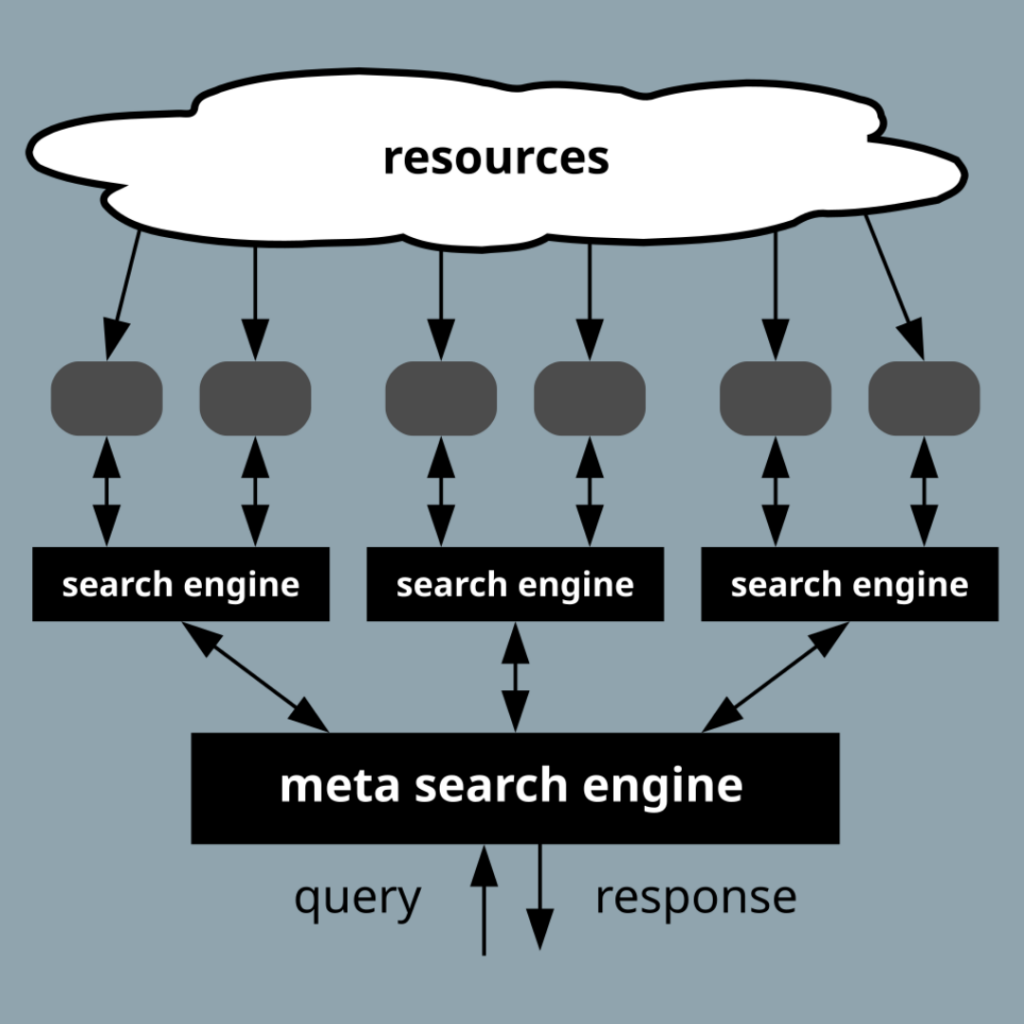
Metasearching
Metaseraching gathers information from multiple search engines and presents you with a curated list of the most relevant results.
In other words, when you type in a search query, the metasearch engine doesn’t actually crawl the web itself. Instead, it sends your search terms to mainstream search engines like Google, Bing, and others and gathers their results. It then filters and ranks them before displaying them to you.
Private metaserach engines have built-in mechanisms to hide IP addresses and other personal information from the search engines they consult.
Usually, metasearch engines make the best search engines for privacy due to their independent nature.
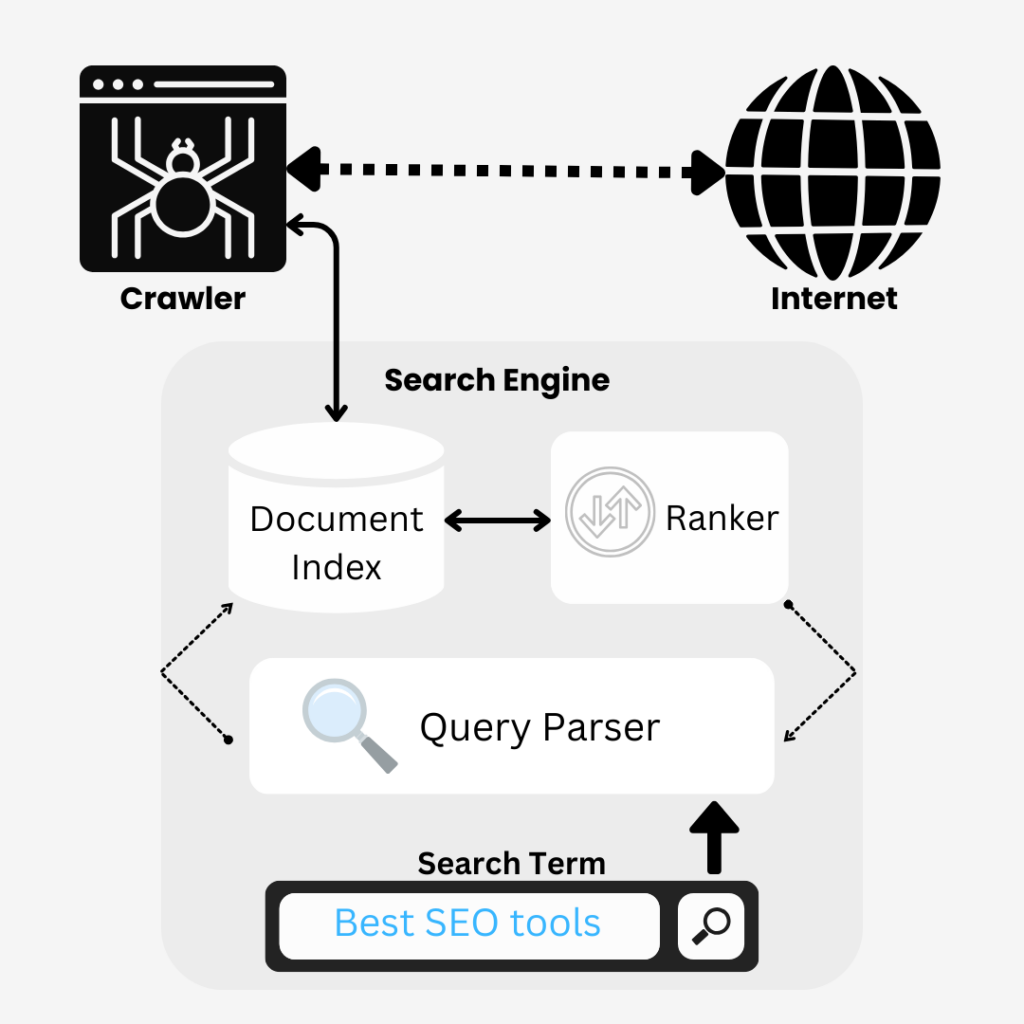
Crawling and Indexing
Some private search engines crawl the web themselves and create their own indexes. Crawling involves automated bots, known as spiders, systematically visiting web pages across the internet. These crawlers follow links from one page to another, gather data, and store it in the search engine’s index.
When you enter search terms, the search engine digs into the index and pulls up the most relevant search results.
This mechanism ensures better privacy than metasearching by keeping your search activities within the engine itself. They are also better at delivering results that align closely with your search terms.
Now, let’s get to the real deal and find you the best privacy-focused search engine.
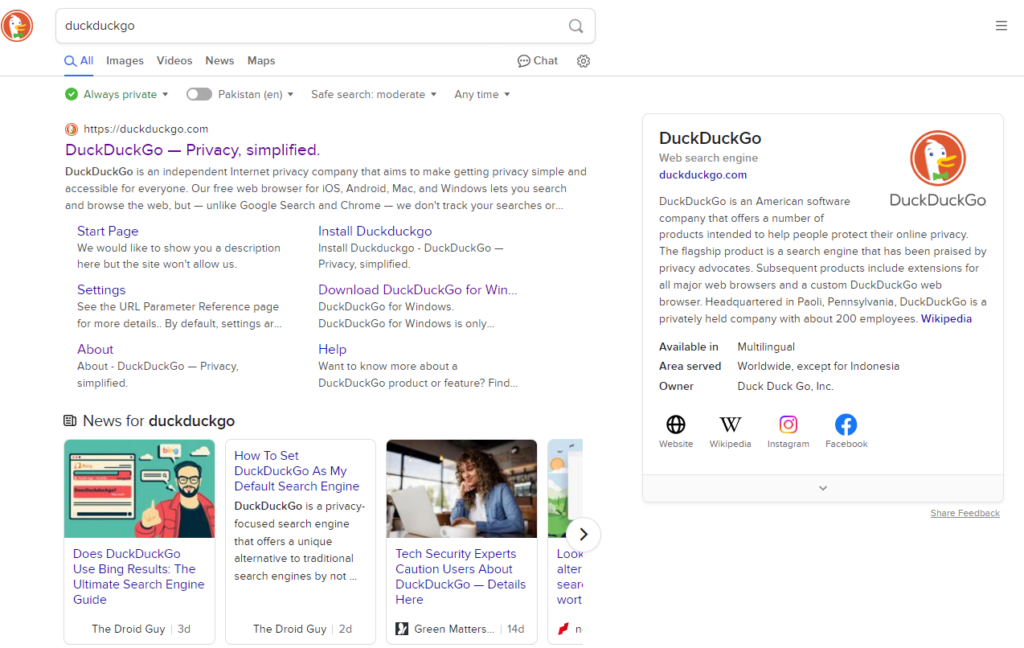
4 Best Search Engines for Privacy
We have tested and curated this list of the best search engines for privacy based on their efforts to improve privacy.
1. DuckDuckGo (DDG)
First off, we have DuckDuckGo (DDG) on this list, which came out on September 25, 2008. It offers a better, more privacy-friendly way to search the web. It also offers a solution to the tracking and usage of personal data by mainstream search engines.
DDG promises to never track or store any personal information about its users. They’ve designed their system so that they aren’t even able to build a search history for any individual.
The search results you see on DDG come from a mix of sources, over 400. Some of these major sources include Bing, Yahoo! Search BOSS, Wolfram Alpha, and Yandex.
When DDG sends a search query to a partner for search results, the request travels through DDG’s proxy servers. This means that the partner only sees DuckDuckGo’s information, not yours. So, even though DDG relies on external sources for search results, your personal details stay hidden.
But DDG isn’t fully dependent on these third-party sources as it has its own web crawler known as the DuckDuckBot.
For location-based search terms, such as finding local weather, DDG uses a GeoIP lookup to guess your IP’s location. Right after serving the results, it discards both the guessed location and your IP address.
Moreover, DDG also uses encryption so your internet provider or anyone else can’t see the searches you make. It also provides a Tor onion service, which lets you access the search engine through the Tor network. The Tor engine is famous for its strong anonymity.
Additionally, instead of using cookies to remember your settings, DDG allows you to store your preferences using URL parameters. By doing so, it stores your choices without storing any personal data.
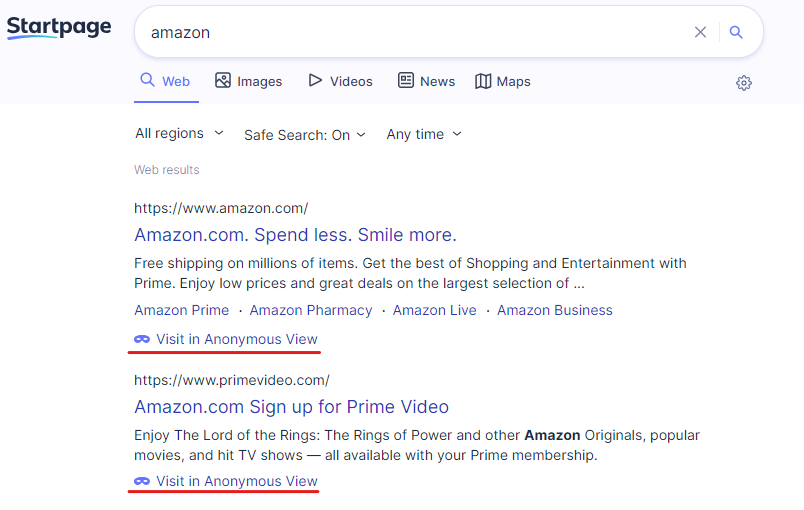
2. Startpage
Startpage is one of the best alternative search engines for those who prioritize privacy without sacrificing search results quality. As a metasearch engine that uses Google’s indexes, it delivers highly relevant search results but without recording information.
No matter who you are or where you’re searching from, Startpage returns the same unprofiled search results to everyone. Your personal data has no influence on the relevant search results you see.
Now, you might ask how Startpage ensures privacy when it depends on Google. Let me explain how.
When Startpage receives a search query, its on-premise servers immediately remove your data, including your IP address. Afterward, your search query goes to their second layer of servers, called application servers.
These servers then retrieve search results from Google, but since your personal data isn’t there, the search is completely anonymous. Lastly, the on-premise server sends the results back to you. That’s how your search remains private from start to finish.
Startpage is also the best search engine for privacy because it originates in the Netherlands. Being EU-based means they have to follow the European consumer privacy laws, including the GDPR.
They received the European Privacy Seal in 2011 as recognition for their highest standards of privacy.
Startpage also offers a unique feature called Anonymous View, which allows you to visit websites anonymously. This feature prevents websites from tracking you with the following:
- Cookies
- Fingerprinting
- Social media trackers
Startpage only shows ads that are directly related to your search query. These ads are contextual, not targeted, meaning they don’t follow you around the web.
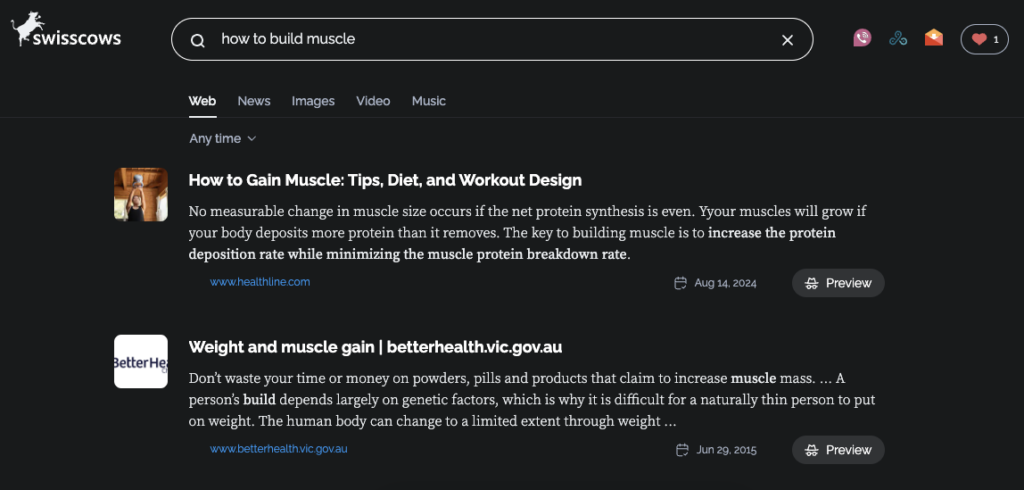
3. Swisscows
Swisscows is a unique private search engine for its strong commitment to family-friendly content and ethical values.
Swisscows sources relevant search results from Bing in addition to a unique proprietary index it has built with its web crawler. This allows Swisscows to offer a broad range of search results while maintaining full control over the data it processes.
The search engine does not index pornographic or sexual content, which makes it a suitable choice for families and educators.
It doesn’t use cookies or any tracking technologies and never stores or builds your search history. The ads you see on Swisscows are contextual ads, meaning they relate to your current search query only. They aren’t a product of any personal data or past behavior.
Another major feature of Swisscows is its semantic data recognition. The features use machine learning to understand the context of your queries and provide faster and more accurate answers. Over time, the search engine learns to intuitively respond to your questions.
The search engine’s data center is set in the Swiss Alps, far from the reach of both the EU and the USA. This means that they are not subject to any legal demand to disclose data for governmental surveillance.
Beyond its commitment to privacy, Swisscows also financially supports ethical causes. When you use the search engine, a portion of the revenue from search ads goes to charitable causes.
One of my favorite things about Swisscows is the anonymous Preview feature. There’s a Preview button under each search result. When you click it, Swisscows generates a screenshot and an AI-based description of what the webpage covers. It also detects trackers for you to help you decide whether you should open the site.
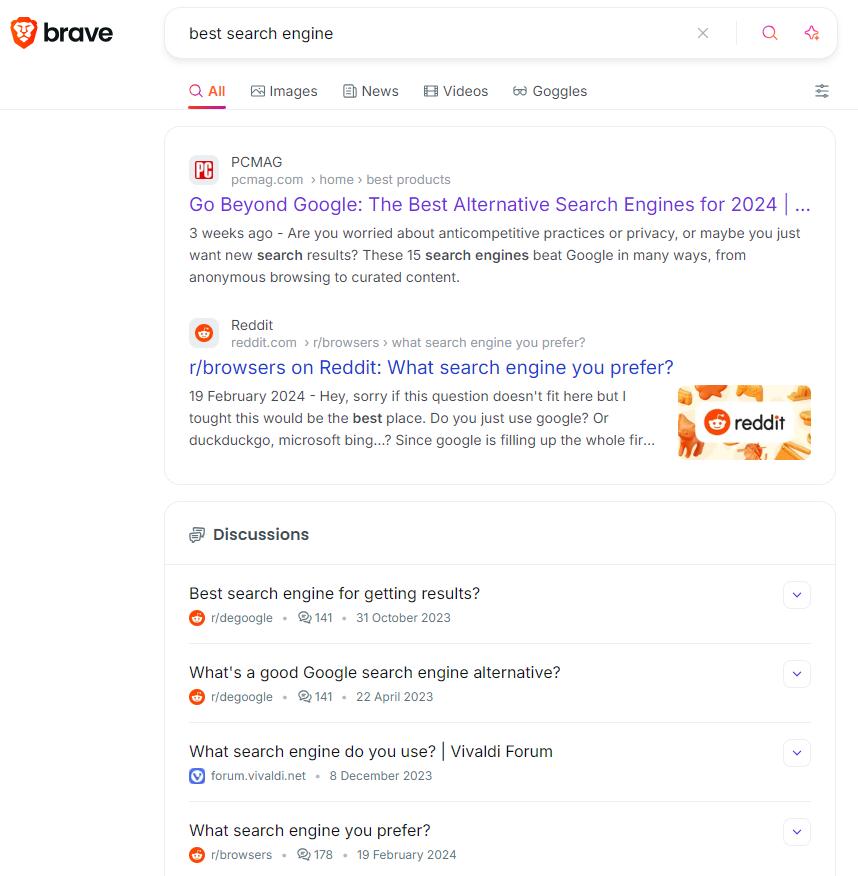
4. Brave Search
Brave Search prioritizes privacy, independence, and user empowerment.
It doesn’t profile you at all. While Brave temporarily processes IP addresses to detect and prevent bots or fake IPs, it deletes these IPs within seconds. So, there’s no way for Brave to tie search terms back to individual users.
The relevant search results Brave serves results from its own independent index of the web. This means it doesn’t rely on data hungry companies, so there’s no risk of bias, censorship, or search results manipulation.
It also empowers users by offering anonymous community contributions to refine results to search queries. It uses a unique feature called Goggles, which allows individuals or communities to create alternative ranking models.
Brave Search also offers a choice between AI-powered results and standard web results. With the Answer With AI button in the search bar, you can get a concise summary of your search query.
Another unique feature of Brave Search is Discussions. Brave automatically generates the Discussion panel from discussion forums when they can provide valuable insights or alternative viewpoints.
This feature often pulls from platforms like Reddit and StackExchange. This ensures that your search results include first-hand perspectives and not just the most SEO-optimized content.

2 Best Android Search Engine for Privacy
For phones, especially Android ones, certain privacy search engines offer an app.
Here are a couple of the best Android search engine for privacy.
1. MetaGer
MetaGer is a privacy-focused metasearch engine from Germany. It is the project of a non-profit organization, SUMA-EV.
MetaGer operates using 24 small-scale web crawlers under its control. As a metasearch engine, MetaGer combines results from various search indexes, including Yandex, Bing, Yahoo, eBay, and Brave.
The metasearch engine doesn’t save or share your IP address or useragent. Though it temporarily stores full IP addresses for a maximum of 96 hours. This is only to limit the number of searches per internet connection. After 96 hours, MetaGer erases your IP address from its servers.
For mobile phones, the search engine currently offers an app for Android only.
Moreover, MetaGer saves search settings by using non-personally identifiable cookies. This means you can customize your search experience without worrying about data tracking or logging.
The platform also collects anonymous data on the frequency of page views and usage of individual functions.
MetaGer offers an anonymizing proxy server as well. By clicking Open Anonymously at the bottom of the search results, you can route your request through MetaGer’s proxy server. The proxy server fully protects your personal data while you’re browsing websites.
What makes MetaGer qualify as one of the best search engines for privacy is its transparency. Its code is open source, meaning it’s publicly available for review and contributions.
Additionally, MetaGer is sensible about its carbon footprint, which is why it uses renewable energy entirely.
For the highest level of security, MetaGer even operates an instance on the Tor network, accessible through the Tor browser.
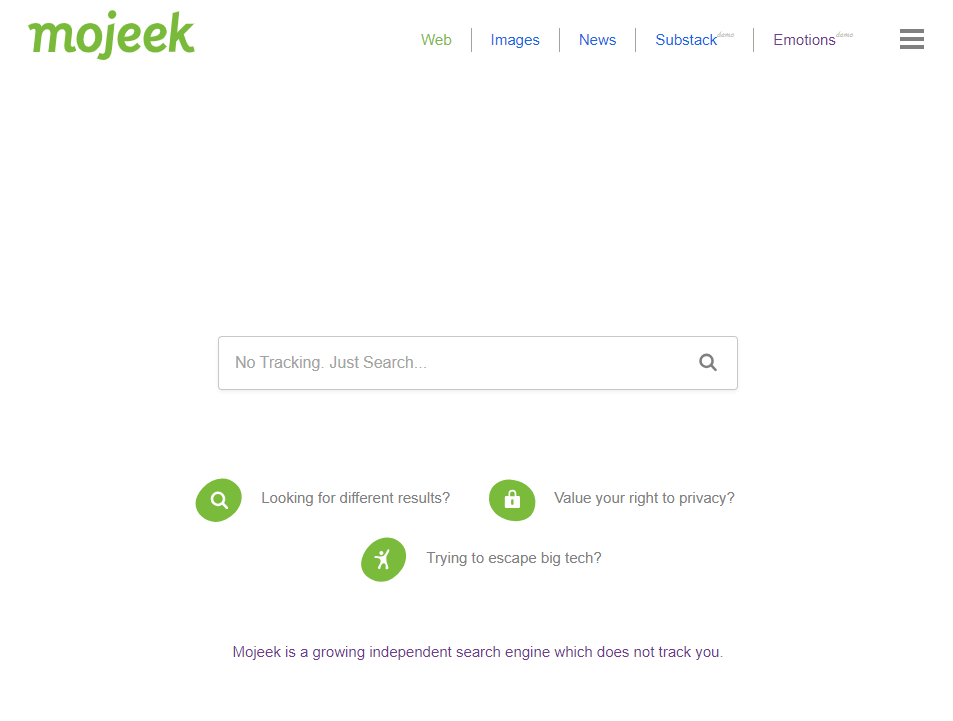
2. Mojeek
Mojeek is a UK-based search engine that stands out with its clear focus on privacy and neutrality in search results.
Just like other private search engines, Mojeek doesn’t collect or store any personal information. This includes no IP addresses, no search history, and no click behavior.
Mojeek has an interesting history. According to it, Mojeek was initially a hobby project by a developer trying to rank his website on Google.
The developer ended up making a fully independent search engine with its own search index. As of 2024, its web crawler has indexed around 8 billion pages.
This self-built index allows Mojeek to operate independently of mainstream search engines. This makes it a genuine alternative to Google with competitively fast search speed. Most queries take less than 300 milliseconds, with a median response time of just 88 milliseconds.
Because Mojeek doesn’t engage in user tracking, it ranks search results using purely objective factors. This way, it delivers neutral, unbiased, and similar search results for everyone regardless of their past search terms.
Moreover, instead of recording your full IP address, Mojeek replaces it with a simple two-letter code representing your country of origin. This further protects your identity while still allowing Mojeek to provide location-based and relevant search results.
Mojeek is also ecologically conscious, which is why it hosts its operations in the UK’s greenest data center, Custodian.

How Do Search Engines Make Money?
Now comes the hot question that you might have: How do privacy-focused search engines make money without Ads?
Well, different search engines have different ways of making money. While some search engines rely heavily on advertising, others might focus on user-supported models or offer premium services.
Let’s explore the common business models among the best search engines for privacy.
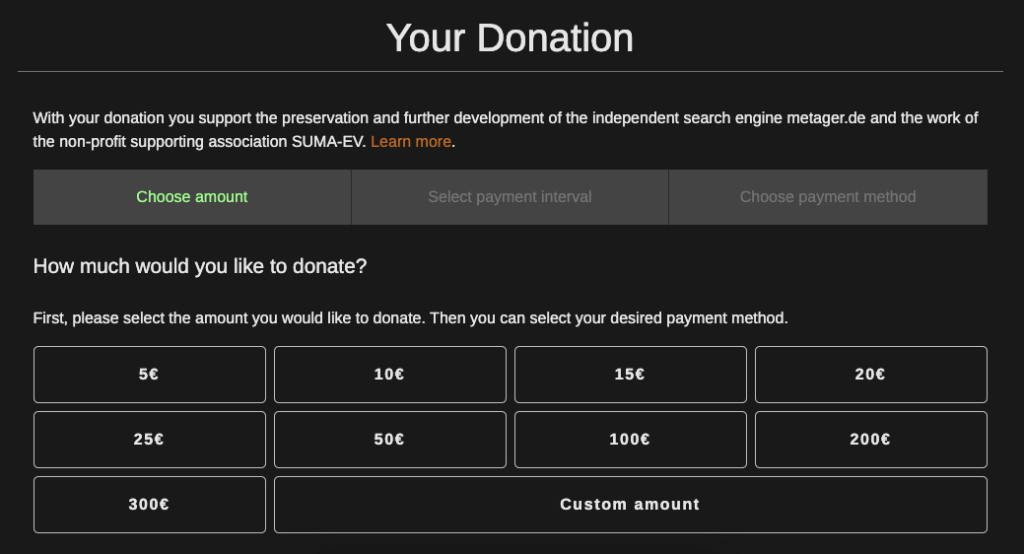
Donation-Supported Non-Profits
Some search engines operate as nonprofits and rely on donations from users and supporters to fund their operations. This business model is common among private search engines aiming to provide a service free from commercial interests.
Swisscows and MetaGer are search engines that fall under this category. They rely on donations to cover costs like server maintenance and development.
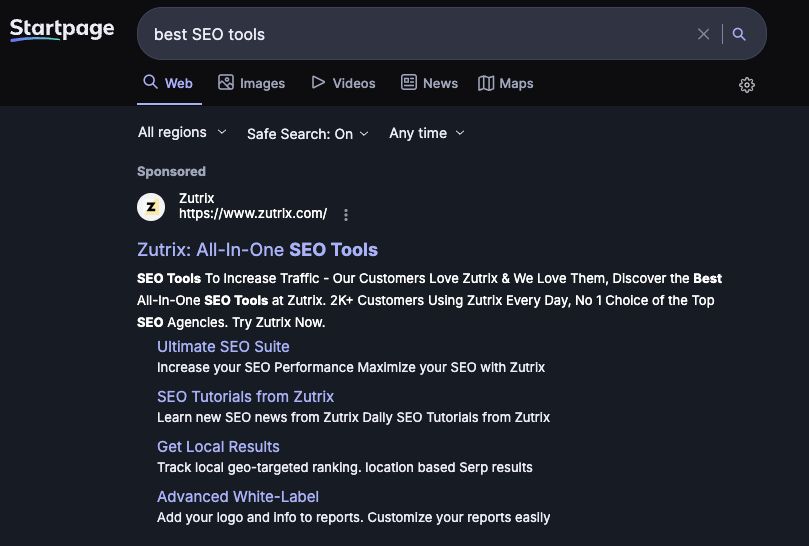
Contextual Advertisements
Since privacy search engines don’t record personal information, they can’t deliver personalized ads. This is why these alternative search engines turn to an alternate method of showing ads: contextual advertising.
Contextual ads depend solely on the content of the search query. This means that the ads you see are related to what you’re searching for at that moment. This involves no tracking of your search history or personal information.
Startpage is one of the users of this earning model.

Affiliate Link Programs
In this model, search engines include affiliate links in their search results or alongside them. When a user clicks on one of these links and makes a purchase, the search engine earns a commission.
DuckDuckGo is a prime example of a search engine that uses this model. It participates in affiliate programs with companies like Amazon and eBay. Whenever a user clicks on an affiliate link and buys something, DuckDuckGo receives a small percentage of the sale.

Premium Versions
Some search engines offer a premium version of their service, which usually includes an ad-free experience or better privacy options. Users pay a subscription fee to access these premium features.
MetaGer offers a paid, ad-free version of its search engine. Once you make the payment, you will get a limited number of tokens, depending on the amount. Making a search query consumes tokens by one.
FAQ
Here are some FAQ to further clarify your confusion about maintaining online privacy.
Which search engine is best for privacy?
There’s no consensus on which is the best search engine for privacy. All private search engines offer differing levels of privacy. There are many good ones, like DuckDuckGo, Startpage, Swisscows, Brave Search, and more. You should consider using the one you feel best respects your privacy.
Can I trust incognito?
Incognito mode, or private browsing, only prevents your browser from saving your history, cookies, and site data after the session ends. It doesn’t hide your activity from your internet service provider, employer, or the websites you visit. It offers limited privacy but isn’t a comprehensive solution.
Are private search engines actually private?
Private search engines are generally more privacy-focused than mainstream ones like Google. They avoid tracking your searches, storing your IP address, or creating user profiles.
However, the level of privacy can vary, so it’s important to choose one that aligns with your needs the best.
Personalization With the Help of geoPlugin!
While all the privacy search engines we discussed have genuine claims, they can only offer privacy for search queries. In other words, they promise private searching but not private browsing.
Once you click on a website from search results, the browser platform takes charge, which usually lacks privacy features.
You can change this by using private browsers such as DuckDuckGo or Brave. Until then, even the best search engine for privacy isn’t capable of offering private browsing.
Lack of private browsing means websites can still see IP addresses and other information. But this isn’t necessarily a bad thing; for the most part, it isn’t. Websites require this information to deliver personalized experiences that visitors highly demand.
A 2021 McKinsey survey revealed that 71% of consumers expect personalization, and 76% find it frustrating if there isn’t any. So, to run your website without frustrating and eventually losing a huge chunk of customers, you need personalization.
This is where geoPlugin’s geolocation services can help you. Integrating geoPlugin’s API with your website can let you monitor visitors’ IP addresses and know other essential details about them.
Then, you can use the collected information to display personalized content and implement marketing strategies such as geopricing.
So give geoPlugin a try and work towards improving your customer’s experience!












